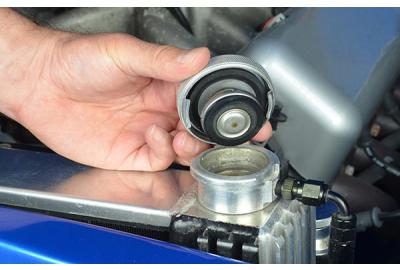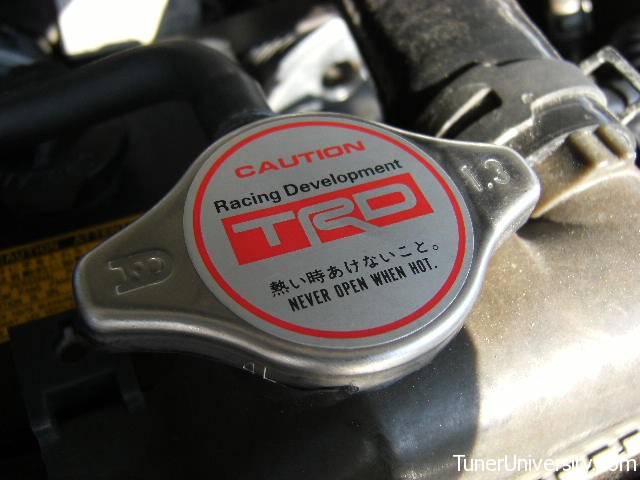If the radiator cap pressure is too high, it can cause significant issues. The cooling system might fail, leading to engine overheating.
Your car’s radiator cap plays a crucial role. It maintains the right pressure in the cooling system, ensuring the engine runs smoothly. When the pressure is too high, it can lead to major problems. The radiator cap pressure is designed to control the boiling point of the coolant.
If it’s too high, the coolant could boil over, causing overheating. This can damage engine components and lead to costly repairs. Understanding the effects of high radiator cap pressure is essential for maintaining your vehicle’s health. Keep reading to learn more about the potential consequences and how to prevent them.
Radiator Cap Function
The radiator cap plays a crucial role in your car’s cooling system. It helps maintain the right pressure and prevents overheating. Understanding the radiator cap function is essential for vehicle maintenance.
Purpose
The radiator cap serves two main purposes:
- It seals the cooling system to prevent coolant loss.
- It maintains the proper pressure for efficient cooling.
By keeping the system pressurized, the radiator cap ensures the coolant can absorb more heat. This helps keep the engine temperature within a safe range.
Mechanism
The radiator cap has a spring-loaded valve that controls pressure. Here’s how it works:
- The cap seals the radiator, preventing air from entering.
- As the engine heats up, the coolant expands, increasing pressure.
- When pressure reaches a set limit, the valve opens, releasing excess pressure.
- Coolant flows into the overflow tank, maintaining a stable system pressure.
If the radiator cap pressure is too high, it can cause several issues:
- Hose Damage: Excess pressure can cause hoses to burst or leak.
- Radiator Damage: High pressure can damage the radiator itself, leading to leaks.
- Engine Overheating: Inadequate pressure release can result in engine overheating.
Maintaining the correct pressure in the radiator cap is vital for your car’s health. Regularly check and replace the radiator cap if needed.

Credit: www.carparts.com
Pressure Regulation
The radiator cap plays a key role in maintaining the right pressure in your car’s cooling system. This pressure regulation is vital for preventing the engine from overheating and ensuring efficient performance. But what happens if the radiator cap pressure is too high? Let’s dive deeper into this topic.
Normal Levels
The radiator cap is designed to hold a specific pressure level, usually between 13 to 16 psi (pounds per square inch). This range is considered normal for most vehicles. The cap acts as a valve to release excess pressure and prevent damage.
If the pressure goes beyond this range, it can lead to issues. The cap may fail to release the excess pressure, causing the cooling system to malfunction. This can result in overheating, engine damage, or even a burst radiator.
Measurement
Regularly checking the radiator cap pressure is essential. You can use a radiator cap pressure tester to measure it. Follow these steps:
- Ensure the engine is cool before starting.
- Remove the radiator cap carefully.
- Attach the pressure tester to the radiator neck.
- Pump the tester to the recommended pressure level.
- Observe the pressure gauge for stability.
If the pressure exceeds the normal range, the cap needs replacement. Using the right tools and following these steps can help maintain a healthy cooling system.
Here’s a table summarizing the key points:
| Aspect | Details |
|---|---|
| Normal Pressure Range | 13 to 16 psi |
| Measurement Tool | Radiator Cap Pressure Tester |
| Steps for Measurement |
|
Maintaining the right pressure in your radiator cap can prevent major engine issues. Regular checks and using the correct tools ensure your vehicle stays in top shape.
High Pressure Causes
Understanding what happens if radiator cap pressure is too high is crucial for maintaining your vehicle’s health. High pressure in the radiator can lead to several issues. Let’s explore the primary high pressure causes and their effects on your car.
Engine Overheating
One of the main problems caused by high radiator cap pressure is engine overheating. When the pressure is too high, the coolant cannot circulate properly. This prevents the engine from cooling down. As a result, the temperature rises.
High pressure can also cause the coolant to boil. Boiling coolant produces steam, which cannot cool the engine efficiently. This leads to further overheating. Overheating can damage engine components, leading to costly repairs.
Here are some signs of engine overheating:
- High temperature gauge reading
- Steam coming from the engine
- Strange smells from the engine compartment
Cooling System Issues
High radiator cap pressure impacts the entire cooling system. The increased pressure can cause leaks in hoses and seals. It can also damage the radiator itself.
Here is a table summarizing common cooling system issues caused by high pressure:
| Component | Possible Issue |
|---|---|
| Hoses | Leaking or bursting |
| Seals | Cracking or leaking |
| Radiator | Cracks or leaks |
High pressure can also reduce the efficiency of the water pump. The pump must work harder to circulate coolant, which can cause it to wear out faster.
Here are some signs of cooling system problems:
- Coolant leaks under the car
- Frequent need to refill coolant
- Unusual engine noises
Addressing high radiator cap pressure promptly can prevent these issues. Regular maintenance and inspections can help keep your cooling system in good shape.
Risks Of High Pressure
Having the correct pressure in your radiator cap is crucial for your car’s performance. If the radiator cap pressure is too high, several risks arise. High pressure can lead to serious problems that may damage your vehicle. Below, we explore the main risks associated with high radiator cap pressure.
Coolant Leaks
High pressure in the radiator cap can cause coolant leaks. The excess pressure forces coolant out of weak spots in the system. Leaks can occur at the hoses, radiator seams, or gaskets. Losing coolant can lead to engine overheating. Overheating can cause severe engine damage.
Radiator Damage
Another risk of high radiator cap pressure is radiator damage. The radiator is designed to handle a specific pressure range. When the pressure exceeds this range, the radiator may crack or burst. This damage can lead to coolant loss and engine overheating. Repairing or replacing a damaged radiator can be costly.
Symptoms Of High Pressure
Understanding the symptoms of high radiator cap pressure is crucial for maintaining your vehicle’s health. High pressure can lead to various issues that need prompt attention. Recognizing these symptoms early can prevent costly repairs. Let’s dive into the most common signs.
Steam Emission
One clear symptom of high pressure is steam emission. If the radiator cap pressure is too high, it can force coolant out of the system. This often results in steam coming from under the hood. The steam indicates that the coolant is boiling. This can damage the engine and other components. Frequent steam emission suggests a need to check the radiator cap pressure.
Engine Temperature Rise
Another symptom is a rise in engine temperature. High pressure can cause the engine to overheat. The coolant system may fail to regulate the temperature effectively. The temperature gauge on your dashboard may show higher readings than normal. Overheating can lead to severe engine damage. Regularly monitor the engine temperature to avoid such issues.
Preventive Measures
Maintaining the right pressure in your radiator cap is crucial for your car’s health. High pressure can cause engine issues, leaks, or damage. Taking preventive measures can save you from costly repairs and ensure your vehicle runs smoothly.
Regular Maintenance
Regular maintenance is key to preventing high radiator cap pressure. Check your radiator and cap during routine car inspections. Look for any signs of wear or damage. A faulty cap may not maintain the correct pressure, leading to engine problems.
Schedule a professional inspection at least twice a year. This helps identify potential issues before they become serious. Regular checks can extend the life of your radiator and cap.
Proper Cap Selection
Choosing the right radiator cap is essential. Ensure the cap matches your car’s specifications. Using an incorrect cap can lead to improper pressure levels. Check your vehicle’s manual for the recommended cap type and pressure rating.
Consider buying caps from reputable brands. Quality caps offer better performance and durability. Avoid cheap alternatives that may fail under high pressure. Investing in a good cap can save you from future headaches.
Solutions To High Pressure
High radiator cap pressure can cause damage to your car’s cooling system. It can lead to leaks, overheating, or even a blown head gasket. Addressing this issue quickly is crucial. Here are some solutions to high pressure.
Cap Replacement
The first step is to check the radiator cap. If the cap is old or damaged, it may not hold the correct pressure. Replace it with a new one. Ensure the new cap matches your car’s specifications. This simple fix can often solve the high-pressure issue.
System Inspection
If replacing the cap doesn’t help, inspect the entire cooling system. Look for leaks, damaged hoses, or a faulty thermostat. These can cause pressure to build up. Fixing these issues can help normalize the pressure.
A professional mechanic can perform a thorough inspection. They have the tools and expertise to find hidden problems. Regular maintenance checks can prevent pressure issues before they start.

Credit: flex-a-lite.com
Long-term Impact
High radiator cap pressure can have significant long-term effects on a vehicle’s engine. Over time, these impacts can lead to costly repairs and decreased performance. Understanding these effects can help prevent damage and maintain the vehicle’s efficiency.
Engine Wear
Consistently high radiator cap pressure can accelerate engine wear. The increased pressure puts extra stress on engine components. This stress can cause seals and gaskets to fail prematurely. Leaks may develop, leading to coolant loss. Without sufficient coolant, the engine can overheat. Overheating can cause significant damage.
High pressure can also affect the radiator itself. The radiator may develop cracks. These cracks can lead to further coolant leaks. The engine may not get the cooling it needs. This cycle of damage can reduce the engine’s lifespan.
Efficiency Loss
High radiator cap pressure can also result in efficiency loss. The engine may not run as smoothly. Increased pressure can cause the cooling system to work harder. This extra work can reduce fuel efficiency. The engine may consume more fuel. Over time, this can lead to higher fuel costs.
Reduced efficiency can also affect the vehicle’s performance. The engine may not produce power as effectively. Drivers may notice a decrease in acceleration. The vehicle may also become less responsive. These changes can affect the driving experience.
| Impact | Description |
|---|---|
| Engine Wear | Increased stress on components, leading to leaks and overheating. |
| Efficiency Loss | Reduced fuel efficiency and decreased engine performance. |
Keeping the radiator cap pressure at optimal levels is crucial. Regular maintenance can help avoid these long-term impacts.

Credit: www.tuneruniversity.com
Frequently Asked Questions
What Are The Signs Of High Radiator Cap Pressure?
High pressure can cause leaks, overheating, and hose bursts. Watch for these signs.
Can High Radiator Cap Pressure Damage The Engine?
Yes, it can cause engine overheating and damage due to excessive pressure.
How Does High Radiator Cap Pressure Affect The Cooling System?
It can lead to coolant leaks, overheating, and possible radiator damage.
What Causes High Radiator Cap Pressure?
Faulty radiator cap, clogged radiator, or failing thermostat can cause high pressure.
How To Fix High Radiator Cap Pressure?
Replace the radiator cap, check for blockages, and inspect the thermostat.
Conclusion
High radiator cap pressure can harm your vehicle. Problems may include overheating, engine damage, and coolant leaks. Regularly check and maintain your radiator cap. This simple step ensures optimal pressure levels. It also helps avoid costly repairs. Taking care of your car’s cooling system is key.
Don’t ignore the signs of high pressure. Your car’s longevity depends on it. Always consult a professional for serious concerns. Stay proactive, and keep your vehicle running smoothly.

















